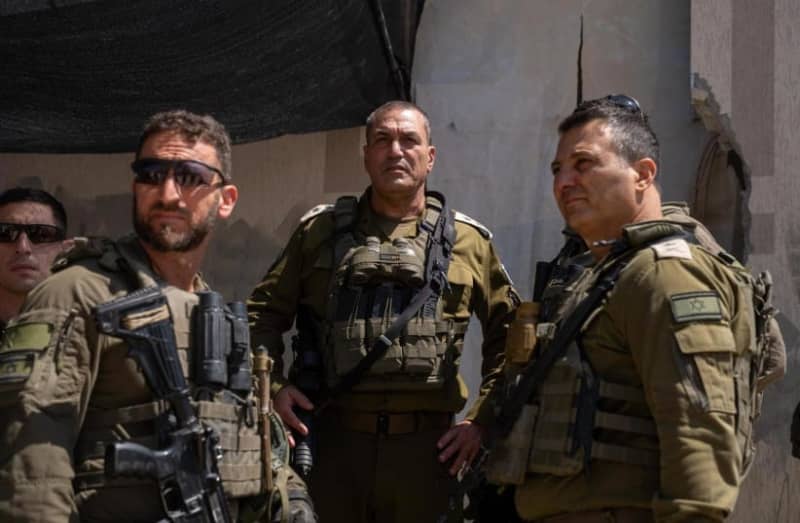Luis Har and Mosab Hassan Yousef told diplomats that the battle with Hamas extends beyond the battlefield into ideas, memory, and survival.
Freed hostage Luis Har and Mosab Hassan Yousef - the former Hamas insider once known as “the Green Prince” for his collaboration with Israeli intelligence - addressed diplomats in Tel Aviv last week with raw testimony and stark warnings about Hamas, ideology, and the conflict’s future.
“I don’t trust anyone, not even Mosab, not even us,” Har told The Media Line, his voice steady but heavy with memories of captivity. “The most important thing for me is my family, my children, my grandchildren, because I don’t believe in politics, I don’t believe in our leaders, nor in our religious leaders. Our fanatics are as fanatic as Hamas, and for me, there is no difference.”
That blunt admission stood in sharp contrast to the morning session, where Har and Yousef shared the stage, weaving together lived trauma and ideological confrontation.
Har described the morning of October 7 in grim detail. “Everything started at 6:29 in the morning … the red alert kept coming. We didn’t understand what was happening,” he recalled.
In confusion, his family turned on the television. “We saw Sderot, the city, and a white Toyota truck driving and shooting everywhere.”
Luis Har, 71, an Argentinian-Israeli hostage who was freed in a special forces operation in Rafah, Gaza, is photographed during an interview with Reuters about his ordeal of being held captive by Palestinian Islamist group Hamas, in Tel Aviv, Israel March 27, 2024. (credit: REUTERS/HANNAH MCKAY)
Minutes later, gunmen stormed his home. “We heard them breaking the windows, coming into the house, and shooting all the doors…We shouted, ‘Stop shooting, stop shooting!’ And they stopped. Then they started taking us outside.”
Dragged through tunnels and confined in Gaza, Har endured months of deprivation. “Fernando and I survived on barely one pita a day between the two of us…sometimes just a small piece, with water to get through the day,” he said. He described being rescued by Israeli forces after 159 days. “In Gaza, nothing was easy for anyone…But the most important is that we are alive, the commander brought us back.”
If Hamas succeeds in destroying Israel, they would come after other Muslim sects
Yousef spoke with urgent conviction. “I spent 15 years fighting against Hamas ideology and against Hamas operations, knowing that if Hamas succeeded in destroying Israel, they would come after the Arabs. They would come after other Muslim sects. They would come after the West. Because jihad has no limit.”
He insisted the October 7 assault was not about Palestinian nationalism. “On October 7, Hamas did not kill and kidnap in the name of Palestine. They killed and kidnapped in the name of Allah.”
Yousef’s anger sharpened as he accused the world of denial. “Suddenly, on October 7, barbarism became legitimate and justified. In Gaza, there is only one crime: the use of human shields by the governing authority. That is the responsibility of Hamas.”
He described Hamas’s strategy as a “death culture.” “Hamas knew exactly what they were doing, and they still did it. Why? Because their strategy is to weaponize civilians. They claim to care for the children. And yet, on one hand they push indoctrination that leads children to death, and on the other, when those children die, they blame Israel. This is so twisted. The world must understand it.”
The discussion, hosted by the Jerusalem Center for Security and Foreign Affairs (JCFA) at Tel Aviv’s Carlton Hotel, drew ambassadors and senior diplomats from the Netherlands, Finland, China, Russia, Chile, Congo, Uganda, Estonia, India, and Mali. JCFA President Dan Diker warned that European recognition of a Palestinian state would send a dangerous signal: “If we wanted to give a prize for what Hamas calls the ‘al-Aqsa flood invasion’—mass murder, mass rape and mass kidnapping - the prize would be the recognition of a Palestinian state. The message this conveys is that mass murder pays, terror pays.”
Yousef offered a provocative alternative. “Yes, there is an alternative. An Arab federation makes much more sense than creating another Arab state with borders and an army. What we need is economy, education, infrastructure, cooperation with Israel, and to start building bridges as soon as possible. The illusion of a state will not guarantee prosperity.”
He praised Israel’s democracy even as families of hostages protest in the streets. “This is a real model of democracy, demonstrated in the most difficult times of a nation. Many countries in such a situation would repress the public. I am very proud of how Israel is handling it. Even though it has been perceived by Israel’s enemies as a weakness … in the long term it shows strength.”
Har, in private reflections, remained skeptical of leaders and ideologies alike. “When it suits them, they are Hamas; when it doesn’t, they play the victim,” he said. “The problem is that many people have been born inside Hamas and indoctrinated with hatred. They are taught that Jews are worse than the devil, that we have tails.” For Har, peace is only possible through education: “Every baby is born with a green bandana, given a weapon, and called the next shaheed [martyr]. If there is a change of ideology, starting with education for peace and love, maybe then we can have a future.”
Two men scarred by Hamas - one from within, one from captivity - spoke with voices that were by turns bitter, defiant, and uncompromising. Their testimony underscored that the war unleashed on October 7 is not only a military struggle but also a battle of ideas, memory, and survival.
.png)
 German (DE)
German (DE)  English (US)
English (US)  Spanish (ES)
Spanish (ES)  French (FR)
French (FR)  Hindi (IN)
Hindi (IN)  Italian (IT)
Italian (IT)  Russian (RU)
Russian (RU)  4 hours ago
1
4 hours ago
1








Comments